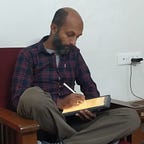Theology : The word that already sounds heavy before you deal with it
The fathers continually remind us that theology is at best broken speech about the transcendent, mysterious God who draws near to us in the incarnation of the Son and the presence of the Spirit.
— Christopher A. Hall, Learning Theology with the Church Fathers ( Illnois: IVP Academic, 2002), 10.
The word has stigma attached to it. Especially in the community I belong to. Yes, all clergy must learn theology in order to step into the ministry. Yet, over time, the term has had to carry the burden of being synonymous with the following definition:
Something related to God that you won’t understand because it is being said by someone who wants to show that they have studied some seminary course, and it won’t make sense to the ordinary person.
This is not a joke. It’s literally the most popular definition in the community that I serve, often hiding under the invisble cloak of silence and nuance. One could even hear its pejorative use among self-depracating clergy who say, “ I don’t speak much (big) theology. I give a simple message that people understand.”
In the process, one concretises a perceived binary relationship between theology (difficult to understand) and “simple message” (which often means a sermon that is shared using the very terms used in the Bible in conjunction with life experiences, with a smattering of stories.
No offence. They are meaningful. But I would protest. The moment you speak about God, you have entered theological territory. Even if one were to contemplate, who God is, one has already begun the exercise of theologising.
That’s why some theologians define the term as, “God-talk”. The moment you say, “Jesus loves you,” it is a theological statement.
How so?
You are talking about a God who took flesh and lived among us (John 1:14), proclaimed and projected the Kingdom of God (Luke 4:16–19; Matthew 5), died on the cross and rose again and will come again to rule over this world. It is this person, you seem to say, loves you. It’s a pretty loaded statement!
Firstly, it carries certain assumptions regarding the person you are speaking of. Secondly, you are assuming it will have an impact on the person you are speaking to.
Fleshing out the above in words is called theology — at least in one sense, which makes the impact of theology crucial. It changes thought patterns and offers new perspective. It affects lives. It can’t be trivialised. Bad theology has reaped destruction (that’s for another post). But good theology leads to salvation. And we have been theologising and speaking theology all along. We simply externalised the term, perhaps, carelessly.
The truth is, the moment you speak from the scripture, you are wearing the garb of a theologian. When you share a testimony, again, it is a robust description of theology from a personal vantage point.
Yet it must be handled with care. A good theologian is aware of the historical development of doctrines, their impact upon individuals, communities and nations and stands firmly rooted in scripture and tradition. She attempts to make sense of the current circumstances of life through theology or creates a theology to interpret the circumstances.
Indeed, if we are talking about an infinite God who is the creator of the universe, of all things visible and invisible, then theology will be, like a puzzle. Let us recall the quote at the beginning of the post. Even the great spiritual fathers of the early centuries were of the opinion that theology is at best broken speech about the transcendent, mysterious God who draws near to us in the incarnation of the Son and the presence of the Spirit.
That’s the beauty of it. The broken speech of a broken people that resonates at a depth — a rare depth that is tangible when one talks about something ultimate.
And what is ultimate? That’s for another post. Stay tuned.
